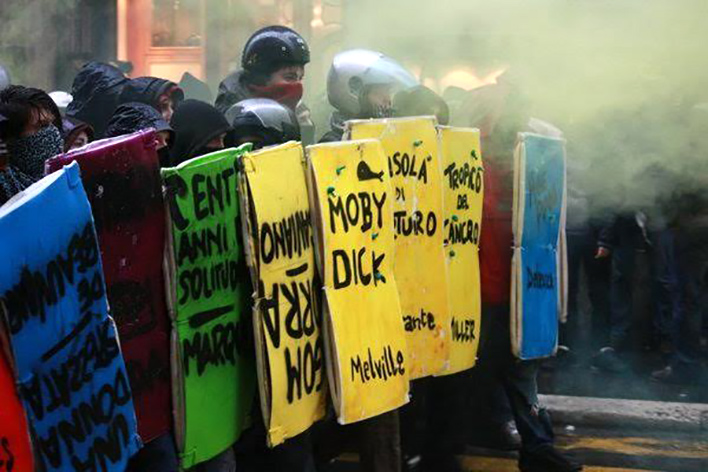Una rappresentazione del potere tra cinema e teatro: il Berlusconi di Elio De Capitani
Abstract
Che fine ha fatto un’incarnazione grandiosa del potere come Riccardo III di Shakespeare, dopo essere passato per Ubu re di Jarry e Artuto Ui di Brecht? Nella nostra epoca postideologica il pubblico chiede storie e non La Storia; personaggi in cui bene e male, forza e debolezza si mostrano nella quotidianità mescolando pubblico e privato. Il saggio analizza le rappresentazioni del potere offerte da Elio De Capitani, attore regista teatrale legato alla tradizione recitativa italiana, sensibile alla tradizione anglosassone e ai linguaggi della contemporaneità; e sceglie l’interpretazione di Berlusconi nel Caimano di Moretti per la sua popolarità e per le sue implicazioni nel contesto italiano.
La metodologia si basa sulla distinzione fra Academic history e Stage history. In un teatro che lega la sperimentazione al testo e al personaggio, in un cinema che continua ad avvalersi dei saperi teatrali, il lavoro dell’attore va messo al centro e va studiato nella sua concretezza e singolarità: processo, esiti artistici, rapporto con la società dello spettacolo.
Il saggio mostra come gli attori siano dentro il presente perché restituiscono non idee astratte ma esseri più veri del vero. E rende giustizia all’interpretazione di De Capitani: al lavoro esteriore e interiore che ne è la base, alla sua visione da ‘comédien’, senza giudizio. Un lavoro capace di far sentire nel Berlusconi trionfante del 2006, in sintonia con parte del paese, il Berlusconi vecchio di oggi.
Downloads
Riferimenti bibliografici
Aliverti, Maria Ines, “Meldolesi legge il Settecento teatrale”, Prove di Drammaturgia, 1-2 (2014): 9-13.
Attisani, Antonio, L’arte e il sapere dell’attore. Teorie e figure, Torino, Accademia University Press, 2015.
Bandettini, Anna, “De Capitani: Niente parodia il mio Silvio è essenziale”, la Repubblica, 24.03.2006.
Belpoliti, Marco, Il corpo del capo, Parma, Ugo Guanda Editore, 2009.
Bentoglio, Alberto - Rondelli, Alessia - Tisano, Silvia, Il Teatro dell’Elfo (1973-2013). Quarant’anni di teatro d’arte contemporanea, Milano, Mimesis, 2013.
Bertone, Clotilde - Fusillo, Massimo - Simonetti, Gianluigi (eds.), Nell’occhio di chi guarda. Scrittori e registi di fronte all’immagine, Roma, Donzelli, 2014.
Byrne, Richard W., “Social cognition: imitation, imitation, imitation”,Current Biology, 13 (2005).
Cantrell, Tom - Luckhurst Mary (eds.), Playing for real. Actors on Playing Real People, London, Palgrave Macmillan, 2010.
De Capitani, Elio, “Così sono entrato nei panni del Caimano”, Diario, 21 (2006): 30-33.
De Gaetano, Roberto, Nanni Moretti. Lo smarrimento del presente, Cosenza, Pellegrini Editore, 2015.
De Marinis, Marco, In cerca dell’attore. Un bilancio del Novecento teatrale, Roma, Bulzoni, 2000.
De Marinis, Marco, Il teatro dopo l’età d’oro. Novecento e oltre, Roma, Bulzoni, 2013.
Deriu, Fabrizio, Gian Maria Volonté. Il lavoro dell’attore, Roma, Bulzoni, 1997.
Donini, Pierluigi, “Introduzione”, Aristotele, Poetica, Ed. Pierluigi Donini, Einaudi, Torino, 2008.
Guccini, Gerardo, “Biographic-theater. Osservazioni sulle rigenerazioni contemporanee dell'attore interprete”, Identità italiana e civiltà globale. Meticciati, relazioni, attraversamenti, rapporti con la modernità, Ed. Ilona Fried, Budapest, Eötvös Lorànd Tudomànyegyetem, 2012: 97-109.
Jandelli, Cristina, I protagonisti. La recitazione nel film contemporaneo, Venezia, Marsilio, 2013.
Id., I ruoli nel teatro italiano tra Otto e Novecento. Con un dizionario di 68 voci, Firenze, Le Lettere, 2002.
Jouvet, Louis, Elogio del disordine, Ed. Stefano De Matteis, Firenze, la casa Usher, 1989.
Josephson, Erland, Memorie di un attore, Ed. Vanda Monaco Westerståhl, Roma, Bulzoni, 2002.
Mariani, Laura, “Intervista a Elio De Capitani”, Bologna, 11 gennaio 2015 (inedita).
Meldolesi, Claudio, Fondamenti del teatro italiano. La generazione dei registi (1984), Roma, Bulzoni, 2008.
Meldolesi, Claudio, Pensare l’attore, Eds. Laura Mariani – Mirella Schino – Ferdinando Taviani, Roma, Bulzoni, 2014.
Morandini, Laura, Luisa e Morando, il Morandini 2007. Dizionario dei film 2006, Bologna, Zanichelli, 2007.
Morreale, Emiliano, “Dumusst Berlusconi werden”, Speciale Il Caimano di Nanni Moretti, Cineforum, 454 (2006).
Podavini, Davide, “Ricezione ed elaborazione della retorica politica contemporanea: il caso della poesia dell’ultimo Raboni”, Between, IV.7 (2014), http://www.Between-journal.it/, online (ultimo accesso: 20/11/2015).
Panosetti, Daniela, “Politicsis so overrated. Michael Dobbs e lo storytelling”, doppiozero, 02.01.2015 http://www.doppiozero.com/materiali/ovvioottuso/politics-so-overrated-michael-dobbs-e-lo-storytelling, online (ultimo accesso: 20/11/2015).
Saglia, Diego, “Parola, corpo, potere: esercizi di lettura dal Julius Caesar di Shakespeare a Death and the Maiden di Ariel Dorfman”, Between, IV.7 (2014), http://www.Between-journal.it/, online (ultimo accesso: 20/11/2015).
Stanislavskij, Konstantin Seergevič, Il lavoro dell’attore su se stesso, Roma-Bari, Laterza, 1997 (1938).
Tcherkasski, Sergei, “Twofaced Giovanni Grasso and His Great Spectators or What Stanislavsky, Meyerhold and Strasberg Actually Stole from the Sicilian Actor”, Sica, Anna (ed.), The Italian method of La Drammatica. Its Legacy and Reception, Mimesis, Milano 2014: 109-132.
Tristano, Alberto Alfredo, “Il caimano Berlusconi, attore prigioniero del potere”, 28.06.2013, http://www.elfo.org/stagioni/20132014/frostnixon.html, online (ultimo accesso: 20/11/2015).
Vicentini, Claudio, L’arte di guardare gli attori, Venezia, Marsilio, 2007.
Vilardo, Maria Cristina, “Elio De Capitani. Il mio Nixon che graffia la vita”, Il Piccolo, 2.12.2014.
Informazioni sul copyright
Questa licenza permette a terzi di riprodurre, distribuire, comunicare al pubblico, esporre in pubblico, rappresentare, eseguire, recitare e modificare quest'opera, purché vengano citati l'autore e la rivista. Questa è la più ampia tra le licenze Creative Commons, rispetto alle libertà concesse a terzi sulle opere licenziate sotto Attribuzione.









